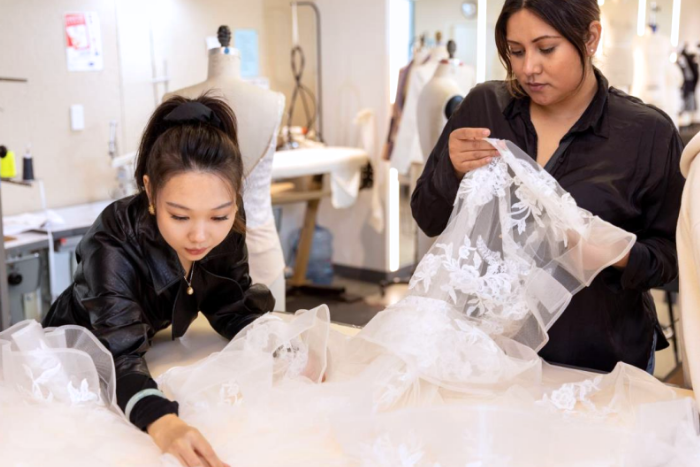A complaint is a gift
In her latest article, Maria Musgrove-Wethey from Get Savvy Academy discusses why you should change your approach to complaints.
If I asked you to complete the sentence “A complaint is …” I can imagine that very few of you would have anything positive to say. Responses would range from time consuming to tedious to annoying. We often view complaints as a waste of time, a personal attack on us/our business, or even a ruse for getting a refund with the threat of a one-star review if we don’t comply.
Presented with a complaint, whether that be in writing, on the phone or face to face, I doubt that your first response is to welcome it and thank the person for complaining! Your bride could be talking about alteration/cancellation costs, straps or bustle loops breaking, buttons popping off, or COVID-19 requirements such as mask wearing and guest numbers…the list goes on. Your first response is likely to be defensive and possibly a tad interrogational whilst frantically checking paperwork to see whether your bride has paid her balance, signed the release form for her dress, or received her “New Normal” e-mail. An apology might be given but many of us think that by saying sorry we’re admitting that we were wrong and run the risk of a compensation claim.
Why don’t we welcome complaints?
Complaining has never had a positive meaning. It comes from the Latin verb plangere which originally meant “to hit”. Today a complaint is the utterance of pain, displeasure, or annoyance and, in legal terms, it is a formal charge or accusation. No wonder no one likes to receive complaints. We see this as a bride daring to tell us how to run our business even after we have bent over backwards to get a gown in with an incredibly short lead time and gone the extra mile to get it fitted. It’s almost as bad as someone sitting down to a dinner you prepared and wrinkling their nose.
Given the negativity around complaints you’re now going to think that I’m mad when I suggest that we should welcome complaints as free feedback. You’re going to think I’m even crazier when I say that when you receive a complaint you should respond with a thank you. Yes, I’m suggesting that we view all complaints as gifts and not as problems.
Where does this idea that complaints are gifts originate?
Back in 1996, Janelle Barlow of TMI (Global Learning and Training Consultancy) wrote the first edition of ‘A Complaint Is a Gift’ and introduced the revolutionary notion that customer complaints are not annoyances to be dodged, denied, or buried, but are instead valuable pieces of feedback and free market research.
What are complaints?
In simple terms complaints are statements about expectations that have not been met. They are also, and perhaps more importantly, opportunities for us to reconnect with our customers by fixing a service or product breakdown. In this way, complaints are gifts customers give to businesses. Everyone will benefit from carefully opening these packages and seeing what is inside.
How to respond to complaints as gifts
In the 2006 version of the book, Barlow and co-author Claus Møller write that our mindset really does influence how we respond to our customers and viewing complaints as gifts is a powerful business mindset for delivering service when our best efforts have collapsed and we don’t give customers what they want. They suggest that we approach a complaint as we would a friend who gives us a present.
Imagine that a friend comes to visit on your birthday with a present. The first thing you would say after greeting them would most likely be an expression of gratitude. “Thank you for coming and thank you for the lovely present.” Your entire verbal and non-verbal language would signal your pleasure at seeing your friend and receiving the gift.
What if you then opened this gift and found that it is something that you already have or you don’t like? What would you say? “Take it away I don’t want it/What are you thinking of giving me this/Have you got the receipt so you can exchange it”. Of course not, you wouldn’t be so rude with a friend who has taken the trouble to buy you a gift.
Now imagine that a customer has called you with a complaint. Would you say, “Thank you for calling and telling us about this. How thoughtful of you. We really appreciate it”? Probably not, but when we receive a birthday present, we do not hesitate. We say thank you because a friend took the time to get us something special. Complaining customers are giving us an opportunity to find out what their problems are so we can help them.
The Gift Formula – The 8 Step Response
As a TMI presenter I ran a course which covered the 8 Step Gift Formula for keeping our language, interactions, and actions consistent with the belief that a complaint is a gift helps us maintain a positive mindset toward complaining customers.
How you talk about complaints shapes how you think about them. If you want to behave as if complaints are gifts, it helps to speak the language. With practice, this approach can become second nature. Just as we thank a friend for a birthday present so too can we respond to a complaint as if it is a gift.
If you’d like to learn more about this 8 Step Gift Formula then watch out for a future article.
If you can’t wait then join our Get Savvy Membership group where this and many other topics are shared in our Business Success Path under Customer Experience and Business Management. We’re reopening membership this month so to find out more click here.













